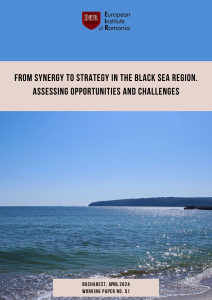Connectivity, the Black Sea Region, and Hungarian Priorities
Erzsébet N. Rózsa & Tamás Szigetvári
In: From Synergy to Strategy in the Black Sea Region.
Assessing Opportunities and Challenges
© European Institute of Romania, 2024
Bucharest, April 2024
Working Papers Series, No. 51, pp 64-65.
The Black Sea and the basin itself have for millennia been a transit route and provided connectivity – for military campaigns or migration among others – among Eastern – and Southeast Europe, the Caucasus, Central Asia, and the Middle East, both on land and on sea.
Yet, it has mostly remained peripheral to mainstream European history, a field of regional power competition (Tsarist Russia and Ottoman Türkiye), and even to global power interests (Great Britain). Despite the fact that, the Black Sea constituted the border between the two worlds, during the Cold War, it was the accession of Romania and Bulgaria to the European Union and to NATO that seemed to offer renewed importance to the region.



